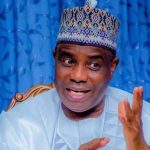The European Union on Friday threw its weight behind the Reserved Seats for Women Bill, joining rights advocates and political stakeholders in pressing for its swift passage.
The bill seeks to create 37 additional seats in the Senate, 37 in the House of Representatives, and three reserved seats per state in all 36 state assemblies—strictly for female candidates.
Currently slated for a third reading in October, the proposed legislation will then be transmitted to state Houses of Assembly before heading to the President for assent.
Women’s representation in Nigeria’s legislature has remained abysmally low, with only 3.7 per cent of Senate seats and 3.9 per cent in the House of Representatives currently occupied by women.
Speaking at the 2025 GOTNI National Leadership Conference in Abuja, Head of the EU delegation to Nigeria and ECOWAS, Gautier Mignot, praised the bill and urged broad national support.
Mignot also appealed to lawmakers to prioritise the legislation, stressing that it would help create exclusive elective spaces for women in governance and foster political balance, particularly in parliament.
He said, “One of the secrets for a nation that will be more successful in their development is to empower women and girls.
“The most prosperous countries in the world are those where inequalities between women and men are the least, and which grant women a full space to participate in collective decisions and in socio-economic life.
“Nowadays, there’s a very important debate ongoing in Nigeria, especially in the National Assembly, about the special seats bill, to make sure that women have more representation in the National Assembly.
“I think this is a very important bill for the country, and it deserves support from everybody.”
Also addressing newsmen after the programme, President of the GOTNI Leadership Centre, Linus Okorie, described the conference as a platform designed to build leadership competencies for individuals, businesses, and government institutions.
He emphasized that Nigeria’s leadership challenges could only be resolved by nurturing the right leaders.
He said, “There is a huge demand for leadership development in Nigeria and the only way we can make progress is for Nigeria to take the responsibility of doing everything necessary to encourage citizens to grow their capital and leadership competencies.
“What this means is that the world is not going to fix our problem.
“Our problem is going to be fixed by Nigerians. And to do that, you need selfless leaders in the private and public sector who are creative, visionary and have a sense of commitment to make a big difference for our dear country.
“The nations of the world that have made great progress are those that invest heavily in the leadership capital of their citizens. Imagine a system where there’s sustainable value generated in the marketplace. What you will have is that a lot of products and services would emerge in the Nigerian space.”









